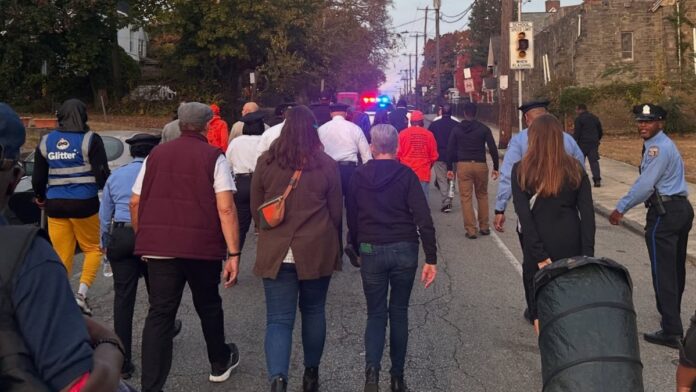Philadelphia has long wrestled with a waste problem. Decades of underinvestment, confusing collection systems, and mutual finger-pointing between residents and officials have left entire neighborhoods buried under the weight of litter and frustration. The city’s reputation as “Filthadelphia” didn’t appear overnight—it’s the result of a system that often seems broken by design.
But one organization is rewriting the narrative, proving that when neighbors take ownership, clean streets and strong communities can go hand in hand.
Glitter, a grassroots cleaning initiative turned citywide force, launched officially in 2021 with a simple but radical concept: give communities the power to fund their own clean blocks and pay local cleaners a living wage to make it happen. The model didn’t start with government backing—in fact, an initial City Council-supported pilot fizzled out before it began. But the idea struck a chord with residents and businesses, who rallied to fund the service themselves.
What began as a small-scale experiment has since grown into a scalable model that now reaches hundreds of blocks each week. The program operates on a pay-what-you-can basis, removing financial barriers while ensuring sustainable employment for those doing the work. According to CEO Brandon Pousley, the impact of consistently clean blocks has been both immediate and far-reaching.
As an educator turned neighborhood advocate, Pousley saw the city’s trash problem spike during the pandemic. Municipal waste services struggled under the weight of staffing shortages and logistical chaos, and streets across Philly fell into disrepair. But amid the mess, Pousley found clarity. What if the same crisis creating uncollected waste and joblessness could fuel a solution for both?
With a pair of gloves and trash bags in hand, he started cleaning his own block. Encouraged by neighbors and energized by a shared desire for change, he teamed up with Glitter’s founder, Morgan Berman, to turn isolated effort into structured action.
Glitter’s approach is both simple and adaptive. By allowing neighbors to sponsor cleanings directly and hire local workers to do the job, the initiative cuts through red tape and delivers results where they’re needed most. Cleaners focus on sidewalks, storm drains, and streets—places often overlooked or inconsistently serviced by city departments.
Research shows a direct connection between cleaner neighborhoods and safer communities. Glitter has become part of broader safety efforts like the Safe Steps Northwest project, which spans over 300 blocks in areas such as Germantown. The idea: cleaner streets encourage more neighborly interaction, boost foot traffic, and make spaces feel cared for—subtly but significantly deterring crime.
Still, Pousley is quick to emphasize that trash troubles in Philadelphia also have a lot to do with broken systems. Confusing and inconsistent collection policies vary by building type, location, and even whether a resident rents or owns. This patchwork approach leaves many Philadelphians unsure of what services they’re entitled to or how to use them.
Standardization, better communication, and enforcement of existing waste rules could go a long way. But while citywide reform inches forward, Glitter is offering a right-now solution. For those tired of waiting on overwhelmed agencies, Glitter provides a tangible path to change.
Glitter focuses on sustained, weekly maintenance by paid professionals, recognizing that real transformation requires more than occasional cleanup drives.
For communities hit hardest by poverty and neglect, Glitter also serves as a job creator. Every pledge from a neighbor not only funds cleaner streets but puts money directly into the pockets of local workers—many of whom live in the very neighborhoods they’re beautifying.
Getting involved is easy. Aspiring cleaners can apply online to join the team, while residents or businesses can sponsor a block with a few clicks—a model that prioritizes accessibility, autonomy, and immediate impact.





